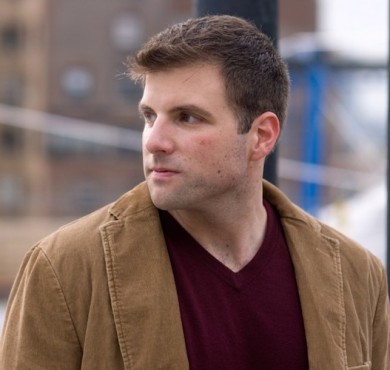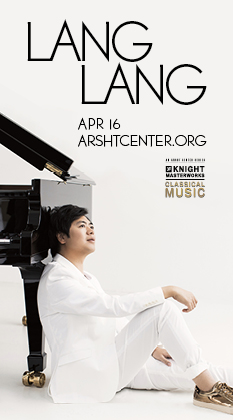Crouch’s distinctive mass receives stirring premiere from Frost Chorale

Shawn Crouch’s “Visions and Ecstasies: A Mass” was given its world premiere by the Frost Chorale Friday night in Miami Shores.
The premiere of a visionary, strikingly original, mass by a gifted South Florida based-composer capped a strong program of new works by the University of Miami’s Frost Chorale on Friday night. Concluding the Saint Martha Concert series at Barry University’s Broad Auditorium in Miami Shores, the concert also impressively displayed the talents of the school’s students and faculty.
The program opened with Tykus by Lithuanian composer and choral director Valcovas Augustinas. Based on a folk song about a young man on a horse who seduces a maiden before leaving her and riding off to battle, the score’s catchy melody gave way to chorus members making a clicking sound, illustrating the horse’s hoofs. The 28-voice choir was led with verve by Jace Saplan, a second year doctoral student in choral conducting.
The Dignity of Difference by Frost Dean Shelly Berg, was heard in its world premiere. Based on the writings of Rabbi Jonathan Sacks, the text is a message of respect for different nationalities languages and beliefs, and deeply relevant in our present world filled with political divisiveness and hate and violence perpetrated in the name of religion or nationalism.
In the choral tradition of John Rutter and Morten Lauridsen, Berg’s work evolves from a sweetly enveloping melody. The vocal patterns build to a huge climax on the words “dignity of difference” with the ending calming and affirmative. Berg played the keyboard part with eloquence and energy. Karen Kennedy, the Frost School’s director of choral studies, drew hushed sonorities and large outbursts from her well-drilled singers while maintaining the songlike thread of Berg’s work.
Visions and Ecstasies: A Mass by Shawn Crouch, was also heard in its world premiere. Previously acclaimed for his Road from Hiroshima (which was premiered in 2005 by Seraphic Fire), Crouch has just been named composition professor at the Frost School. Commissioned by the Saint Martha series, Crouch’s mass is a major addition to the choral literature.
In remarks prior to this debut performance, Crouch said that, as in his previous Hiroshima work, he wanted to write a setting of the Latin mass with additional texts. He turned to the writings of five female mystics which are interspersed with sections of the mass. Central to the score are the opening and closing solos by the mezzo-soprano which are based on two chants by Hildegard von Bingen, the Benedictine abyss, composer and scholar.
While Crouch sets much of the score on variations and permutations of Von Bingen’s writing, his mass is filled with blazing creativity. Mezzo Robynne Redmon entered, singing Von Bingen’s “Ecclesia,” from the back of the auditorium. The noble melody rose to her voice’s highest register and the chorus’ first entry for the “Kyrie” was jarring in its unexpected harmonic patterns. That initial dissonance turned to an inspired melody with the soloist singing recitative-like passages against the choral theme. The entire 45-minute score is filled with those kind of distinctive, yet unexpected compositional touches.
A scampering piano line complements the nervous vocal stream to the text of Von Bingen’s “I Saw a Blazing Fire.” Reflecting the excitement of that vision, Redmon’s full, fearless vocalism spanned leaps of her entire range.
One of Crouch’s boldest innovations is the insertion of a three-song cycle for a separate mezzo soloist in the middle of the mass. Zaray Rodriguez, the talented Frost student who gave an outstanding performance in Osvaldo Golijov’s opera Ainadamar just last week, displayed her rich timbre, secure vocalism and passionate sensibility in Teresa of Avila’s “I saw an angel.” A broad melody of radiant lyricism encompassed “Truth declares to my heart” to the words of Marguerite Porete who was burned at the stake for the alleged heresy of her writing. Julian of Norwich’s revelation “I saw that he is everything that is good” is expressed through art song in the American vein of Barber and Rorem. Rodriguez gave strong attention to the expressive nuances of the cycle’s text, reflecting her surprisingly mature artistry.
The chorus’s cries of “Gloria tua” and “Osanna in excelsis” in the “Sanctus” abound in exultant thematic invention. An unaccompanied “Agnus Dei” cuts to the heart in spare harmonies and rising female vocal patterns in a modern update of Renaissance chant. Clare of Assisi’s vision “Place your mind against the window of eternity” blooms in almost uncontrolled ecstasy. Redmon unleashed the full power of her instrument with the noble chorale of “Dona Nobis Pacem” providing a final contrast before the return to von Bingen.
Kennedy led a stirring performance with the student singers excelling in the tricky rhythmic underpinnings and dynamic contrasts of Crouch’s score. She ceded the baton to Saplan for the final two sections and he captured the quiet mysticism of the a capella “Agnus Dei” superbly. Crouch’s piano writing is almost symphonic in sonority and sweep. Jared Peroune and Matthew Steynor encompassed its intricacies in stellar fashion.
Although the audience’s applause between movements was totally inappropriate during a sacred work, the response illustrated the strong connection Crouch’s outstanding score instantly made with its listeners in this debut performance.
Posted in Performances
One Response to “Crouch’s distinctive mass receives stirring premiere from Frost Chorale”
Leave a Comment
Sat Apr 23, 2016
at 1:30 pm
1 Comment






Posted Jun 10, 2016 at 10:38 am by JJoan Saur
Shawn,
I’m so impressed and proud of my grandson! Also, congratulations on your new position! I hope you have a performance near us sometime. Love to Amanda and Carter,
Grandma & George